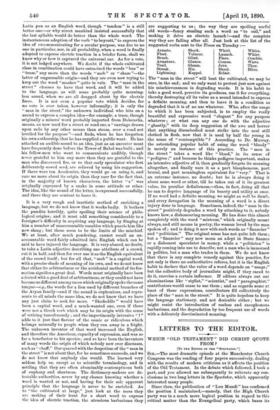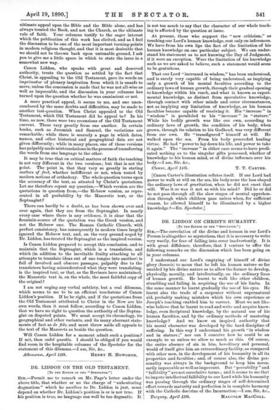LETTERS TO THE EDITOR.
WHICH "OLD TESTAMENT" DID CHRIST QUOTE FROM P
[To THE EDITOR Or THE "SPECTATOR."] Sra,—The most dramatic episode at the Manchester Church Congress was the reading of four papers successively, dealing with the results of modern criticism as it affects the position of the Old Testament. In the debate which followed, I took a part, and you allowed me subsequently to reiterate my con- clusions in two long letters in the Spectator, which apparently interested many people.
Since then, the publication of "Lux Mundi " has confirmed the position I maintained,—namely, that the High Church party was in a much more logical position in regard to this critical matter than the Evangelical party, which bases its ultimate appeal upon the Bible and the Bible alone, and has always treated the Book, and not the Church, as the ultimate rule of faith. Your columns testify to the eager interest which the publication of this work has elicited, and as I feel the discussion to be one of the most important turning-points in modern religious thought, and that it is most desirable that -we should not be thrown back upon untenable ground, I ask you to give me a little space in which to state the issue in a somewhat new way.
Canon Liddon, who speaks with great and deserved authority, treats the question as settled by the fact that Christ, in appealing to the Old Testament, gave its words an imprimatur of plenary inspiration from which it is unsafe to move, unless the concession is made that he was not all-wise as well as impeccable, and the discussion in your columns has turned upon the question whether he was omniscient or not.
A more practical appeal, it seems to me, and one unen- cumbered by the same doubts and difficulties, may be made to another test-question. When Christ appealed to the Old 'estament, which Old Testament did he appeal to ? In his -time, as now, there were two recensions of the Old Testament -current. These vary greatly from one another. In certain books, such as Jeremiah and Samuel, the variations are remarkable; while there is scarcely a page in which dates, names, and other historical and geographical data are not given differently; while in many places, one of these versions has palpably made mistranslations in the process of transferring the words from one language to the other.
It may be true that on critical matters of faith the teaching is not very different in the two versions ; but that is not the point. The point is, that they vary so greatly in stating matters of fact, whether indifferent or not, when tested by modern notions of orthodoxy. The whole question turns upon the accuracy of the text, as attested by Christ's quotations. Let me therefore repeat my question,—Which version are the quotations in question from,—the Hebrew version, as repre- sented in all probability by the Masoretic text, or the Septuagint ?
There can hardly be a doubt, as has been shown over and over again, that they are, from the Septuagint. In nearly every case where there is any evidence, it is clear that the fountain-source of the quotation was the Greek version, and not the Hebrew one. The Roman Catholic Church, with perfect consistency, has consequently in modern times largely ignored the Hebrew text, and, on the very ground urged by Dr. Liddon, has treated the Septuagint as the inspired version.
Is Canon Liddon prepared to accept this conclusion, and to maintain that the Septuagint, which is a translation, and which (in addition to the inevitable frailty attaching to all attempts to translate ideas out of one tongue into another) is full of involved and obscure passages, palpably due to the translators having misunderstood what they were translating, is the inspired text, or that, as the Revisers have maintained, the Masoretic text is, on the whole, the most faithful copy of the original?
I am not urging any verbal subtlety, but a real dilemma, which seems to me to be an efficient touchstone of Canon Liddon's position. If he be right, and if the quotations from the Old Testament attributed to Christ in the New are his own words, then it must follow, according to Canon Liddon, that we have no right to question the authority of the Septua- gint on disputed points. We must accept its chronology, its geographical and other variants, and its many aberrant state- ments of fact as de fide, and must throw aside all appeals to the text of the Masorets as beside the question.
Will Canon Liddon for a moment admit such a position? If not, then cadet quastio. I should be obliged if you would find room in the hospitable columns of the Spectator for the statement of this dilemma.—I am, Sir, &c.,



















































 Previous page
Previous page